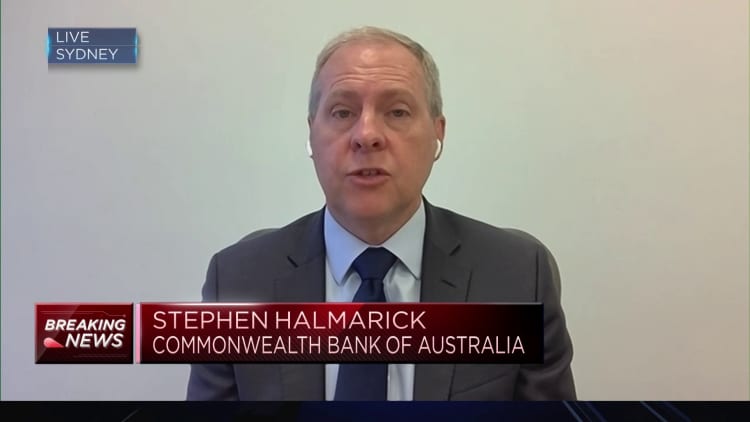Australia's central bank held its official cash rate steady at 4.10% in a closely watched decision Tuesday.
Economists were split on expectations ahead of the decision, with 16 out of 31 respondents surveyed by Reuters forecasting a hike of 25 basis points and 15 expecting the central bank to hold.
Stocks cheered the move as the central bank said inflation in the economy has "passed its peak." The S&P/ASX 200 pared earlier losses and rose 0.5%. The Australian dollar weakened 0.25% to 0.6652 against the U.S. dollar.

"Some further tightening of monetary policy may be required to ensure that inflation returns to target in a reasonable timeframe, but that will depend upon how the economy and inflation evolve," RBA governor Philip Lowe said in a statement.
"Inflation is still too high and will remain so for some time yet," he said.
The Australia Bureau of Statistics' monthly inflation indicator showed some cooling in the rise of prices at 5.6% for the month of May, led by housing prices, food and non-alcoholic beverages.
Australia's monthly inflation indicator peaked at 8.4% in December. The economy's consumer price index rose 7% in the first quarter of 2023.
The decision comes after the central bank raised its cash rate by 25 basis points last month — a move it described as a "finely balanced" decision, according to minutes from its June meeting.
'Time to assess'
Lowe said in Tuesday's statement, "The decision to hold interest rates steady this month provides the Board with more time to assess the state of the economy and the economic outlook and associated risks."
He added that the central bank will continue to closely monitor developments in the global economy, household spending trends and inflation forecasts.
The central bank's decision to hold rates steady was to "assess" the effects of the multiple rate hikes so far, according to IG's Australia market analyst Tony Sycamore.
"The RBA's decision to keep rates on hold today was in some parts based on reasons like the ones that prompted a pause in April — to assess the impact of a cumulative 400bp or rate hikes over the past fourteen months," Sycamore told CNBC.

He added that the central bank now seems less concerned about wage growth, pointing to the wording in Lowe's statement.
The central bank governor said in the announcement, "At the aggregate level, wages growth is still consistent with the inflation target, provided that productivity growth picks up."
Ahead of the decision, Commonwealth Bank of Australia's senior economist Belinda Allen said that the next consumer price index report will be closely watched.
"The recent data flow has been mixed and we think this affords the RBA some time to slow its hiking cycle," Allen said.

